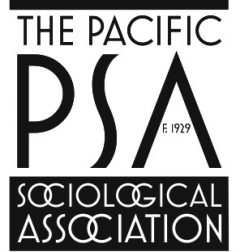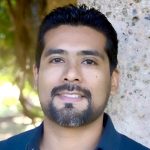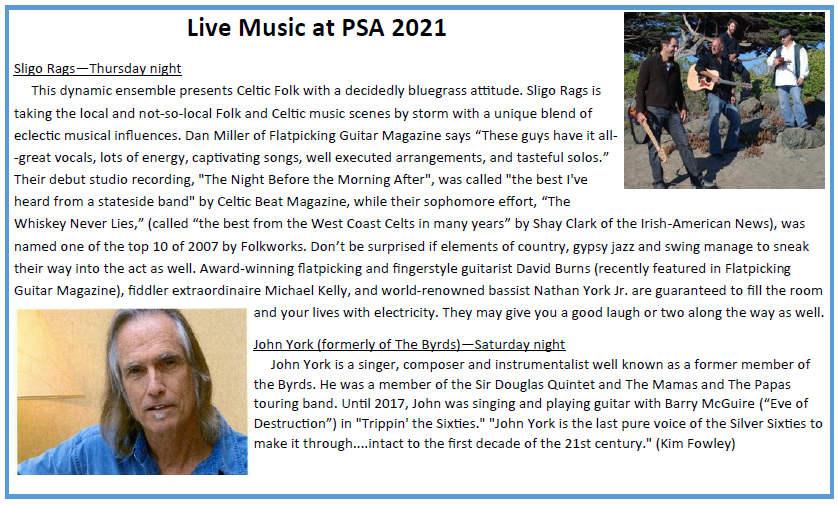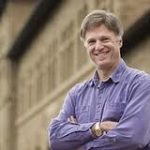2021 Conference
2021 Conference Program (listing of sessions and participants)
President’s Welcome
The 92nd Annual Meeting of the Pacific Sociological Association is rapidly approaching: March 17-21, 2021. The exciting and complex program that has been planned will be the first, in the history of the PSA, to be delivered entirely online using Zoom technology. Although the meeting was originally scheduled to be held in San Diego, California, because of ongoing public health concerns, legal mandates, and a desire to keep participants safe and healthy, it will be held virtually. While we may not be able to gather face-to-face, we have created innovative sessions, breakout rooms, and other opportunities to learn, share, and interact with one other.
From the early days of planning this event, I have referred to it as a super meeting. There are several reasons for this. First, it is scheduled for a full five days. You may remember that our 2020 annual meeting, after much work and planning, was canceled due to increasing concerns about the pandemic. I wish to acknowledge Past-President Dennis Downey, his Program Chair, Elizabeth Sowers, and all of the others who worked on that meeting and did not see it come to fruition. Second, to our benefit, we were able to carry over and include many of the Presidential and Thematic Sessions planned for 2020. And third, I have added some of my own Presidential and Thematic Sessions as your current President that fit with the theme of the 2021 meeting, “The New Normal and the Redefinition of Deviance”.
As a society, a community, and as individuals we have experienced great upheaval in our daily lives this past year. Our taken-for-granted worlds have been impacted and forever changed. We have experienced a pandemic, confronted systemic and interpersonal inequities, and witnessed political insurrection. Many of us have struggled financially, socially, and psychologically. What can be counted on is a PSA program that includes a wide range of research and community involvement sessions on standard topical areas, as well as new ones that reflect current issues facing society today.
We have assembled sessions on both academic and applied sociology. There will be invited panels, thematic sessions, workshops, undergraduate roundtables, film screenings, and meet-the-author sessions. Four Presidential Sessions feature not-to-be-missed sociological luminaries including: Elijah Anderson, Doug McAdam, Pepper Schwartz, and Victor Rios. Another Presidential Session, especially relevant to today, is “Activism: Then and Now”.
Entertainment and social activities are planned for evening hours. One evening, singer, songwriter, and former member of The Byrds, John York, will sing songs of protest, activism, and hope. Another evening, Sligo Rags, a Celtic Bluegrass Band, will sing Irish pub songs, as well as Irish songs about the plight of workers, social inequality, xenophobia, and discrimination. A film screening and a reception are also planned for other evenings..
So, join us for an exciting, ambitious, and timely PSA Annual Meeting this year. Thank you to PSA Executive Director, Lora Bristow; Program Chair, Marcia Marx; the PSA Executive Council, Session Organizers, and all who have worked so diligently to create a phenomenal virtual meeting for us all.
Hope to “see” you at the PSA annual meeting in March.
Sharon K. Davis, PSA President 2020-2021
_______________________________________________
Presidential Session: Reversing the School-to-Prison Pipeline by Way of Urban Dynamism, Sociological Double-Consciousness, and Paradoxical Resistance—Victor Rios
Victor Rios is Associate Dean of Social Sciences and Professor of Sociology at the University of California, Santa Barbara. He received B.A. in Human Development with an Emphasis on Adolescent Development from CSU East Bay in 2000. In 2005 he received his Ph.D. in Comparative Ethnic Studies at the University of California, Berkeley.
Dr. Rios is the author of five books including, Punished: Policing the Lives of Black and Latino Boys (2011); Project GRIT: Generating Resilience to Inspire Transformation (2016); and Human Targets: Schools, Police, and the Criminalization of Latino Youth (2017).
Based on over a decade of research, Rios created Project GRIT (Generating Resilience to Inspire Transformation) a human development program that works with educators to refine leadership, civic engagement and personal and academic empowerment in young people placed at-risk. This program is featured in The Pushouts a documentary funded by the Corporation for Public Broadcasting.
Dr. Rios has worked with local school districts to develop programs and curricula aimed at improving the quality of interactions between authority figures and youths. Using his personal experience of living on the streets, dropping out of school, and being incarcerated as a juvenile–along with his research findings–he has developed interventions for marginalized students aimed at promoting personal transformation and civic engagement. These programs have been implemented in Los Angeles, California (Watts); juvenile detention facilities; and alternative high schools. Dr. Rios has been featured in the Chronicle of Higher Education, Ted Talks, the Oprah Winfrey Network, and National Public Radio. His Ted Talk “Help for kids the education system ignores” has garnered over 1.5 Million views.
A screening and discussion of the documentary film The Pushouts about Dr. Rios’ work will follow this talk; Dr. Rios will join the first 30 minutes of the discussion.
Presidential Session: Undocumented Student Responses to Immigrant Exclusion in the Trump Era
One of the most contentious political divides of the Trump era has been immigration — and unprecedented forms of nativism and exclusion have been at the core of its dynamics. We`ll hear critical analyses from sociologists at the forefront of the field who are engaged with research on how undocumented students have been impacted and responded to immigrant restriction. Organizer: Katie Dingeman, California State University Los Angeles
The Ties That Protect: Does Having Family Ties to Legal Permanent Residents/citizens Buffer the Relationship between Economic Insecurity and Mental Health among Undocumented Students in California? : Josefina Flores Morales, University of California Los Angeles; Laura Enriquez, University of California Irvine; and Cecilia Ayón, UC Riverside
Politically Excluded / Undocu-Engaged: Factors that Inspire the Civic and Political Engagement of Undocumented College Students: William Estuardo Rosales, California State University Los Angeles; Jennifer Najéra, UC Riverside; Laura Enriquez, University of California Irvine
The Complex and Multi-dimensional Nature of Psychological Well-Being of CSU and UC Undocumented Students: Martha Morales Hernandez, University of California Irvine
How Do Undocumented College Students` Academic Outcomes Compare to Those of Their Citizen Peers?: Laura Enriquez, University of California Irvine
Presidential Session: What`s a Sociologist Doing on Reality TV?: What I`ve Learned from Being on `Married At First Sight` about Love and Relationships–Pepper Schwartz
Organizer: Sharon Davis, University of La Verne Panelist: Pepper Schwartz, University of Washington
This will be a conversation on a surprising change in my life. I am one of the experts on the hit show Married at first Sight which is now filming its 13th season. Married at First sight is a franchise from the show`s creative start in Denmark and now is shown in about 26 countries. The premise is startling- and it says it all in the title. We experts (there are three of us, myself, a marriage and family therapist, and a pastor who is also a couples counselor, arrange marriages for men and women who have volunteered for being matched up with someone who they will not meet, or know anything about, until they meet at the altar and are legally married. They will go through eight weeks of married life, having a honeymoon, moving in together, meeting each other`s family and friends, and doing exercises and consultations with us designed to help them know each other, and themselves better, to, we hope, create a bond that will help them want to stay together even when the 8 weeks of the show are over. It is surprising we are doing this, it is surprising that thousands of people ( probably over 100,000 now) have volunteered and surprising perhaps that many have stayed married and at least 8 children have been born. I will explain how we select these people, how we match them, and what I have learned about love, marriage, attraction, and commitment from this experience. And no surprise, as a sociologist, I will also give my perspective on what I have learned about how race, class, age, geography, and mass media play important roles. Finally, perhaps the most amazing part of it all is the extraordinary data we absorb. To my knowledge, no one who has studied intimate relationships and marriage has ever had the data we have: daily, sometimes hour by hour reports on couples in their own homes, interacting with others, and taking on new activities- and all this documented for more than 8 weeks.
Presidential Session: Activism and Social Protest–Then and Now
Organizer: Sharon Davis, University of La Verne Panelists: Glenn Goodwin, University of La Verne; Dan Kennan, University of La Verne; Rose Ash, Community Organizer; Aldo “Bear” Seoane, Sinte Gleska University and Wica Agli; Thomas Allison, University of La Verne/Black Lives Matter; Greg GreyCloud, Wica Agli (Native American Rights)
Presidential Address and Awards
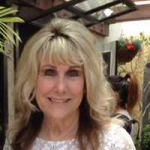 PSA 2021 Awards will be presented, followed by the Presidential Address of Sharon K. Davis on her theme “The New Normal and the Redefinition of Deviance”.
PSA 2021 Awards will be presented, followed by the Presidential Address of Sharon K. Davis on her theme “The New Normal and the Redefinition of Deviance”.
This past year we have endured tremendous social upheaval and social change. Our very assumptions about what is normal, our vocabulary, our routines, and our taken-for-granted worlds have been challenged and impacted. Three major contributors to social change have included political uncertainty and instability; a renewed and urgent focus on institutional and interpersonal inequalities and inequities, with an emphasis on race; and the COVID-19 pandemic. Each of these has impacted the very fabric of our social lives and generated fear, despair, creativity, hope, growth, and ultimately change. Sociologists must continue to study, document, teach, and participate in these issues. Each of us has a unique function and role in this process. The direction of growth, change, and ultimately, the new normal, depends on it.
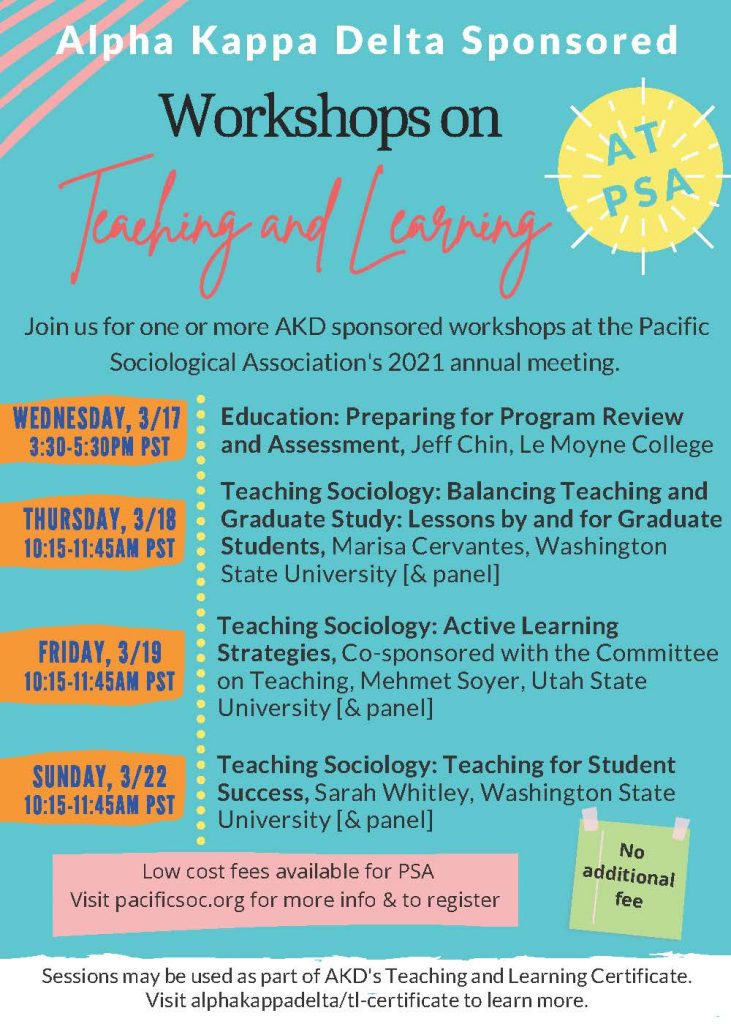
2021 Special Sessions Information
Wednesday, March 17
1:45 pm GIFTS: Good Ideas for Teaching Sociology and for Publishing in TRAILS
3:30 pm The Future of Academic Publishing, sponsored by SAGE Publications
Preparing for Program Review and Assessment (by AKD)
5:15 pm Experiencing the Edited Collection: Author and Editor Perspectives
7:00 pm Presidential Session: Reversing the School-to-Prison Pipeline by Way of Urban Dynamism, Sociological Double-Consciousness, and Paradoxical Resistance (Victor Rios)
8:30 pm Film: The Pushouts (featuring Victor Rios)
Thursday, March 18
8:30 am Race and Education, sponsored by the Committee on the Status of Racial and Ethnic Minorities
10:15 am Book Salon: Obstacle Course: The Everyday Struggle to Get an Abortion in America, by David S. Cohen and Carole Joffe (UC Press, 2020)
Balancing Teaching and Graduate Study: Lessons by and for Graduate Students, sponsored by Alpha Kappa Delta (AKD)
12:00 pm Practical Approaches: Sociology to Professional World: Marketing Sociology as a Skill Set for New Graduates, Sponsored by Committee on Practicing and Applied Sociology
Presidential Session: Undocumented Student Responses to Immigrant Exclusion
Book Salon: Pressure Cooker: Why Home Cooking Won`t Solve Our Problems and What We Can Do About It, by Joslyn Brenton and Sinikka Elliott (Oxford University Press, 2019)
Documenting Evidence of Teaching Effectiveness and Student Learning: Beyond Student Evaluations, sponsored by the Committee on Teaching
1:45 pm Teaching Using Visual Sociology
Getting Jobs in Academia
Book Salon: Latina Teachers: Creating Careers and Guarding Culture, by Glenda M. Flores (NYU Press, 2017)
3:30 pm Presidential Session: What`s a Sociologist Doing on Reality TV?: What I`ve Learned from Being on `Married At First Sight` about Love and Relationships (Pepper Schwartz)
5:15 pm Sociological Star Speaker Doug McAdam: Putting Trump in Context: Race, Region and the Erosion of American Democracy, Sponsored by the Emeritus and Retired Sociologists Committee
7:00 pm Town Hall Meeting: The 2020 Election & Beyond
8:30 pm Music: Sligo Rags
Friday, March 19
8:30 am Workshop: How to Build a Research and Evaluation Center, sponsored by the Committee on Practicing, Applied, and Clinical Sociology
Academic Freedom and the Management of Higher Education, Sponsored by Committee on Freedom in Research and Teaching
10:15 am Book Salon: Tacit Racism, by Ann Warfield Rawls and Waverly Duck (University of Chicago Press, 2020)
Book Salon: From Inside Out: The Fight for Environmental Justice within the Government, by Jill Lindsey Harrison (MIT Press, 2019)
Active Learning Strategies, sponsored by the Committee on Teaching and Alpha Kappa Delta (AKD)
12:00 pm Book Salon: Durable Ethnicity: Mexican Americans and the Ethnic Core, by Christina Sue and Edward Telles (Oxford University Press, 2019)
Of and For the Community: Academic/Activist Partnerships, and the Role of Sociology in Social Justice Struggles, Sponsored by Committee on Rights, Liberties, and Social Justice
Publishing Qualitative Work: Ask an Editor
1:45 pm Sorokin Lecture, Elijah Anderson: Black in White Space: Challenges for Civil Society, Sponsored by the American Sociological Association
3:30 pm Making it Count: Implications and Sociological Relevance of 2020 U.S. Census
Teaching and Research in Politically Sensitive Times, sponsored by the Committee on Freedom of Research and Teaching
5:15 pm Protest in the Age of Trump
CSU Chairs Meeting
7:00 pm Film Session: Using Media to Teach About Threats to Democracy
Saturday, March 20
8:30 am Be The Change You Want To See In The World: Teaching at the Community College Level, Sponsored by Committee on Community Colleges
10:15 am Film: A Reckoning in Boston
Publishing in Peer-reviewed Journals
Book Salon: The Politics of Losing: Trump, the Klan, and the Mainstreaming of Resentment, by Rory McVeigh and Kevin Estep (Columbia University Press, 2020)
Online, Flipped, and Remote Teaching Innovations, sponsored by the Committee on Teaching
12:00 pm Community College Forum, Sponsored by ASA and the PSA Committee on Community Colleges, Sponsored by Committee on Community Colleges
Book Salon: Fearing the Black Body: The Racial Origins of Fat Phobia, by Sabrina Strings (NYU Press, 2019)
1:45 pm Forum for Contingent Faculty, Sponsored by the American Sociological Association and the PSA Committee on Teaching
“Healthy Pedagogy”: Promoting and Negotiating Student and Faculty Health through Teaching, sponsored by the Committee on Teaching
Media, Activism and the 2020 Election
3:30 pm Understanding Social Justice and Social Change Through Music
Grad Fair
5:15 pm Presidential Session: Activism and Social Protest–Then and Now
Disruptions, Pivots and Pauses in Higher Education, sponsored by the Committee on the Status of Racial and Ethnic Minorities
Grad Fair
7:00 pm Presidential Address (President Sharon K. Davis) and Awards Ceremony
8:30 pm Music: John York (formerly of The Byrds) John York is a singer, composer and instrumentalist well known as a former member of the Byrds. He was a member of the Sir Douglas Quintet and The Mamas and The Papas touring band. Until 2017, John was singing and playing guitar with Barry McGuire (“Eve of Destruction”) in “Trippin’ the Sixties.” “John York is the last pure voice of the Silver Sixties to make it through….intact to the first decade of the 21st century.” (Kim Fowley)
Sunday, March 21
8:30 am Highlighting 2021 Award Winners, Sponsored by Awards Committee
10:15 am Reproduction, Domestic Violence, and Public Policy, sponsored by the Committee on the Status of Women
Gentrification in the Rural West Book Discussion: Dividing Paradise: Rural Inequality and the Diminishing American Dream, by Jennifer Sherman (UC Press, 2021), and Pushed Out: Contested Development and Rural Gentrification the U.S. West, by Ryanne Pilgeram (University of Washington Press, 2021)
Teaching for Student Success, sponsored by Alpha Kappa Delta (AKD)
12:00 pm Relationships and Parenting, sponsored by the Committee on the Status of Women
Book Salon: Manufactured Insecurity: Mobile Home Parks and Americans` Tenuous Right to Place, by Esther Sullivan (UC Press, 2018)
Tips and Tricks to Navigating the Path to Becoming Faculty at the Community College, Sponsored by Committee on Community Colleges
1:45 pm Thinking about Being an Editor? What You Need to Know
Book Salon: Of Love and Papers: How Immigration Status Affects Romance and Family, by Laura Enriquez (University of California Press, 2020)
5:15 pm Film Session: The Condor and the Eagle
We will have a Grad Fair this year, in a virtual format, on Saturday, March 20, 3:30-6:45 pm PST. Use this form to sign up your program. Grad Fair will be in a virtual room, where visitors can enter and go to designated areas of the room for each program, then engage in live video chats with the program representatives. Programs can also send in documents and links for a Resources page for students to download. The fee is $100.
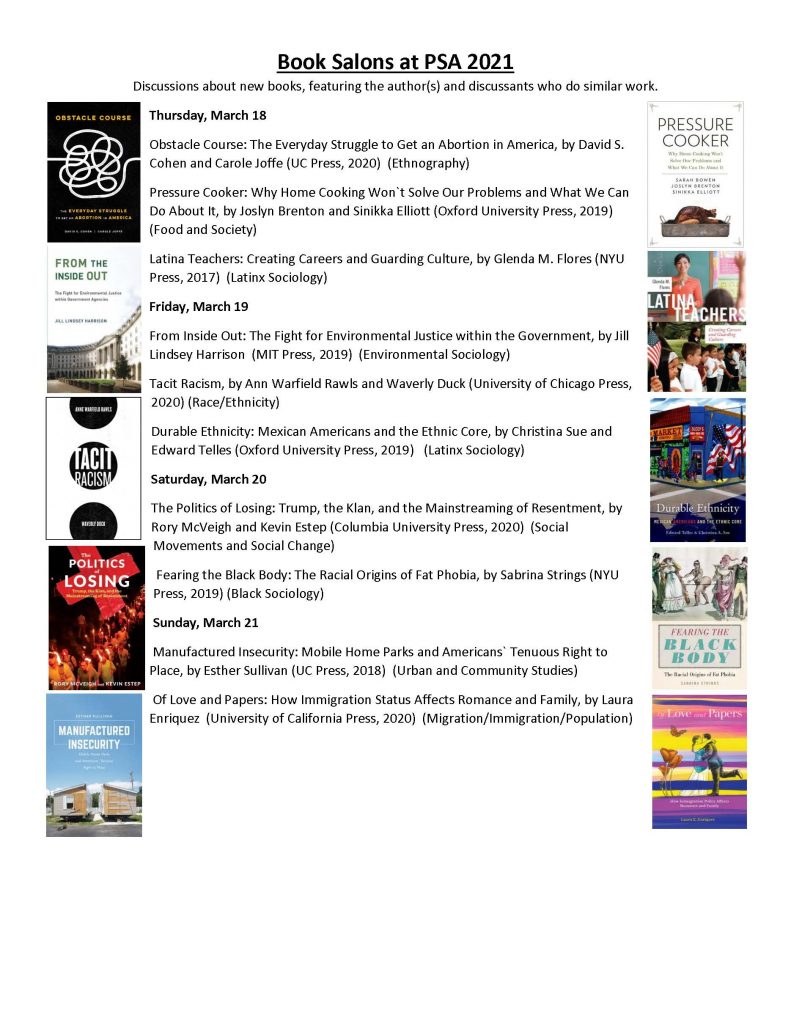
Documentary Films at PSA 2021
The Pushouts, featuring Victor Rios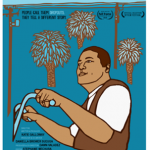
“I was in prison before I was even born.” So begins the story of Victor Rios – a high school dropout, gang member, and three time felon by 15. But when a teacher’s quiet persistence, a mentor’s moral conviction, and his best friend’s murder converge, Rios’ path takes an unlikely turn.
Two decades later Rios – by then a 36 year-old tenured UC professor, author and national thought leader on the school-to-prison pipeline – gets a call. “Hey Hotshot.” It’s Martín Flores, Rios’ high school mentor, who he hasn’t heard from in 15 years. “I know you’re busy, but I need you to come down to Watts this summer and work with my kids.” It’s a make it or break it moment for these youth, Flores – who directs a program serving 16 to 24 olds who haven’t finished high school – warns. “We get them on the right path now, or we lose them to the system.”
Woven with archival material stretching back 25 years to Rios’ own troubled adolescence and including the contemporary story of this fateful summer in Watts, THE PUSHOUTS examines crucial questions of race, class, power, and the American dream at a particularly urgent time.
Discussion following the film facilitated by María Malagón, California State University Fullerton.
A Reckoning in Boston
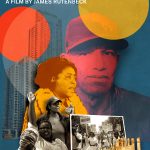 In fall 2014, Kafi Dixon and Carl Chandler enrolled in a rigorous night course in the humanities at a community center in their Boston neighborhood of Dorchester.
In fall 2014, Kafi Dixon and Carl Chandler enrolled in a rigorous night course in the humanities at a community center in their Boston neighborhood of Dorchester.
Kafi, 44, sharp, witty and restless, dropped out of school at 15. She had her first baby a year later and two more soon after. Carl, 65, who lives on a small pension and disability payment in one of Boston’s most dangerous neighborhoods, began the class with a keen interest in learning but little faith in educational institutions.
White suburban filmmaker James Rutenbeck came to Dorchester to document the students’ engagement with the Clemente Course in the Humanities. The Clemente Course is taught in 34 sites across the U.S.–to those who have experienced homelessness, transitioned out of incarceration or faced barriers to a college education. The Clemente mission is to foster critical thinking through deep engagement with history, literature, philosophy and art history. Clemente students, its proponents assert, become fuller and freer citizens.
But over time James is forced to come to terms with a flawed film premise and his own complicity in racist structures. As he spends time with Carl and Kafi, he’s awakened to the violence, racism and gentrification that threaten their very place in the city.
Troubled by his failure to bring the film together, he spends more time listening than filming and enlists Kafi and Carl as collaborators/ producers with a share in the film revenues. Five years on, despite many obstacles, Kafi and Carl arrive at surprising new places in their lives, and following their lead, James does too.
Discussion after the film featuring film-makers Kafi Dixon and James Rutenbeck, facilitated by Mary Texeira and Marcia Marx, California State University San Bernardino
Trailer: https://www.areckoninginboston.com/trailor-1
The Condor and the Eagle
 Four Indigenous leaders embark on an extraordinary trans-continental adventure from the Canadian Boreal forests to deep into the heart of the Amazonian jungle to unite the peoples of North and South America and deepen the meaning of “Climate Justice”. The Condor & The Eagle documentary offers a glimpse into a developing spiritual renaissance as the film four protagonists learn from each other’s long legacy of resistance to colonialism and its extractive economy.
Four Indigenous leaders embark on an extraordinary trans-continental adventure from the Canadian Boreal forests to deep into the heart of the Amazonian jungle to unite the peoples of North and South America and deepen the meaning of “Climate Justice”. The Condor & The Eagle documentary offers a glimpse into a developing spiritual renaissance as the film four protagonists learn from each other’s long legacy of resistance to colonialism and its extractive economy.
With the continuous expansion of pipeline projects throughout the Americas these Indigenous women and men represent the last remaining landholders who refuse to sacrifice their territories to transnational oil companies. Their unification in New York first and later in Paris are among many similar and burgeoning initiatives, mostly led by Indigenous women, that have inspired people around the world to rise for the protection of the earth and give life to the climate justice movement.
Melina Laboucan-Massimo and Bryan Parras’s lands were devastated by the oil industry and it has remained an acceptable secret, with no coverage from the media, and limited support from their governments. Bryan has always lived in the energy capital of the world, Houston. He grew up uprooted from his Indigenous origins until the day he met with other Indigenous people who vowed to bring back respect for the land and ancient cultures. So begins his journey to rediscover his true self, the meaning of being Indigenous. Even as her people were dying in the Alberta tar sands, Melina’s sister was recently murdered: violence against the Earth, begets violence against women. This tragic event set into motion her quest for justice, which will lead her halfway across the globe.
Ancient native prophecies say: “When the Eagle of the North and the Condor of the South fly together, Indigenous peoples will unite the human family”. Filmed in the verdant jungles of the Amazon (Ecuador and Peru), the brightly colored cultures of the Pan American First Nations communities (Vancouver, Alberta) and the United States Indian tribes (Oklahoma), viewers glimpse extraordinary beauty in the places, faces and regalia of traditional people. The Condor & The Eagle follows the protagonists as they develop a resistance strategy that matches the level of their opponents – taking their effort to South America, Europe and beyond. Their task is to make local battles an International concern and finally expose criminal corporations responsible for serious crimes. The film promotes an intercultural dialogue by showing how non-Indigenous and Indigenous people come together.
**Donations will be collected, to benefit the groups featured in the film and the struggle for environmental justice, for No More Sacrificed Communities.**
Discussion after the film facilitated by James Courage Singer, Salt Lake Community College.
Sociological Star Speaker Doug McAdam: Putting Trump in Context: Race, Region and the Erosion of American Democracy, Sponsored by the Emeritus and Retired Sociologists Committee
It would be hard to overstate Donald Trump’s corrosive effect on American democracy. That said, the tendency is to see Trump as the principal source of our divisions and the fragile state of our democracy. For all his “contributions” in this regard, Trump is the extreme product and expression of prior trends and events. It’s important that we understand these older roots, lest we think that having removed him from office, we are well on our way toward restoring the health and well being of American democracy.
In the talk, I seek to put Trump in historical context in three ways. The three ways reflect the central themes articulated in Deeply Divided, a book I co-authored with Karina Kloos in 2014.
First and most importantly, we sought to document and explain the critically important shift in the “racial geography” of American politics that began in the 1960s and which, over time, has transformed the Republican Party—the party of Lincoln—from the more progressive on race, to today’s coalition of extreme racial conservatives.
Second, we sought to call attention to the serious erosion in America’s democratic norms and institutions that had occurred before Trump was elected and which, in fact, greatly aided his rise to power.
Finally, we called attention to the transformative effect that a little appreciated change in the process by which we nominate presidential candidates had served to marginalize the “median voter,” while greatly amplifying the influence of the mobilized ideological wings of the two parties, especially in the Republican Party.
Removing Trump from power has no real effect on these three illiberal features of American politics. To begin to restore American democracy, we will need to contend, not simply with the damage Trump has done to democratic institutions and norms, but with these more enduring features of American politics as well.
Town Hall Meeting: The 2020 Election & Beyond
What kinds of political divisions and developments shaped U.S. electoral politics in 2020 and are likely to continue to shape U.S. politics? What is the future of U.S. democracy? We invite you to enjoy and participate in a lively political discussion with panelists whose areas of expertise include the politics of race, gender, sexuality, immigration, class, and rural America as well as the social psychology of political polarization, the evolution/devolution of the Left, media and democracy, and social movements. Organizer: Ellen Reese, UC Riverside Panelists: Deana Rohlinger, Florida State University; Rengin Firat, University of California Riverside; Arlene Stein, Rutgers University; Laura Enriquez, University of California Irvine; Stephanie Mudge, University of California Davis; Jennifer Sherman, Washington State University; Elijah Anderson, Yale University
Sorokin Lecture, Elijah Anderson: Black in White Space: Challenges for Civil Society, Sponsored by the American Sociological Association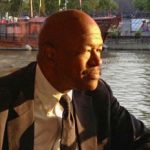 Since the end of the Civil Rights Movement, large numbers of black people have made their way into settings previously occupied only by whites, though their reception has been mixed. Overwhelmingly white neighborhoods, schools, universities, workplaces, restaurants, and other public spaces are still common. Blacks often perceive these settings as “white space,” which they know to be informally “off limits” for people like them. When present, they experience occasional disrespect based on their color, during which whites draw subtle and explicit distinctions that remind them that they “don`t belong.” These expressions of symbolic racism indicate the modern American color line.
Since the end of the Civil Rights Movement, large numbers of black people have made their way into settings previously occupied only by whites, though their reception has been mixed. Overwhelmingly white neighborhoods, schools, universities, workplaces, restaurants, and other public spaces are still common. Blacks often perceive these settings as “white space,” which they know to be informally “off limits” for people like them. When present, they experience occasional disrespect based on their color, during which whites draw subtle and explicit distinctions that remind them that they “don`t belong.” These expressions of symbolic racism indicate the modern American color line.
Making it Count: Implications and Sociological Relevance of 2020 U.S. Census
The US decennial census is inherently political, and the 2020 Census was particularly contentious as the federal administration called, unsuccessfully, for a citizenship question to be added. The 2020 Census also took place in the unprecedented context of the COVID-19 pandemic. This timely panel of
census experts will discuss the major issues related to the implementation of the 2020 census, and how those could affect census data users. Topics will include political and policy consequences of the census, issues including undercount, and information relevant to census data users such as new differential privacy methods. Organizers: Georgiana Bostean, Chapman University, and Luis Sanchez, CSU Channel Islands Panelists: Beth Jarosz, Population Reference Bureau; Raoul Lievanos, University of Oregon; Dudley Poston, Texas A&M; Victoria Velkoff, US Census Bureau
Protest in the Age of Trump
Social movements on both the left and the right are highly mobilized in the United States right now. This session will help us to understand the factors driving contemporary mobilizations, who is mobilizing and why, and to better understand the powerful possibilities and limitations of movements to bring about the changes that many of us would like to see. Organizer: Nella Van Dyke, University of California Merced Discussant: Doug McAdam, Stanford University Panelists: Emmanuel Cannady, University of Notre Dame; Rory McVeigh, University of Notre Dame; David Meyer, University of California Irvine; Veronica Terriquez, University of California, Santa Cruz
Media, Activism and the 2020 Election
Panelists will briefly respond a few open-ended questions regarding media, activism, and the 2020 election from a scholarly perspective. The bulk of the panel will be interactive with panelists responding to questions and comments from session attendees. The goal of the panel is to synthesize sociological knowledge regarding phenomena relevant to the 2020 election as well as to identify opportunities for innovation in research, teaching, and communication. Organizer: Deana Rohlinger, Florida State University Panelists: Jennifer Earl, University of Arizona; Kristine Wright, Los Angeles Southwest College; Andy Lee Roth, Project Censored; Francesca Tripodi, University of North Carolina
